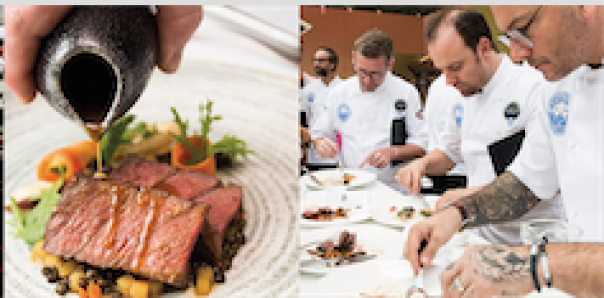
Over the past weeks, the Guild has been speaking to judges, winners and former finalists to discover what makes the competition unique and how the winning moment felt for them.
2012 winner and a regular NCOTY judge, Alyn Williams, said: “Hearing my name as the winner was a fantastic feeling. It’s only two hours of cooking but it is super intense. I really wanted to win, but genuinely wasn’t expecting it as I was up against a group of very good cooks. Winning NCOTY puts you in a very positive position; the industry respects it and to win it improves your credibility. It helps with confidence and creates new opportunities.”
Fellow judge and group executive development chef at Gordon Ramsay Group, James Petrie said: “I love the opportunity to see what the next generation of talented chefs are producing. Each time I judge, I am amazed at the thought-process of the chefs to create these brilliant dishes, under such immense pressure.”
Russell Bateman also admitted to being surprised but "elated" when his name was called out as the 2014 winner: “There was also an element of nerves as I was stepping in to big shoes. It’s not just about winning on the day, or even just for the following year. You are becoming an ambassador for the competition for the future so there’s a lot to live up to. Winning this title means more people now know who I am, and different circles of people know who I am. It has also given me opportunities that I wouldn’t have experienced before. Owning the title gives you more recognition and respect as someone who goes the extra mile and is prepared to put in hard work.”
As the winner of the title in 2016, James Devine explained: “Competitions are like a catalyst for learning and improving. When you apply yourself and put yourself in a pressure cauldron like that, you come out a stronger chef and person regardless of the outcome. NCOTY will be one of the scariest moments of your career but it’s also one of the best. Personally, I just tried to enjoy it as I knew it was a once in a lifetime opportunity and was not likely to happen again.”
For those looking for last minute entry tips, here are some of words of wisdom: -
Alyn Williams: “The best piece of advice I was given was to prepare my dessert first. It’s absolutely the best advice as doing that gave me more time at the end to stay focused. Another good piece of advice is to simply to make sure you have three strong dishes. It may sound like common sense, but it’s surprising how often we see cooks paying more attention to one dish over another.”
Larry Jayesekara: “One of the biggest challenges of the competition was working to the time limit and being able to organise and deliver the all three courses exactly how you would like them to be served. That’s why my advice would always be to keep the dishes simple. It is so easy to make it over-complicated.”
Luke Selby: “I think the biggest challenge that I had was getting everything I had to do executed consistently, to a standard I was happy with, in the time frame. That was hard to overcome but I just drilled myself and refined everything until I could pull it off in the time.”
Hayden Groves: “You learn a lot about yourself as a cook by going through the process, how can you make the dishes better in the two-hour time limit, through honing, developing and feedback. You build up a great rapport with fellow competitors, organisers and ultimately the judges, it is vital that you get feedback on how you can take that forward be it into the final or for the next competition. Ultimately if you don’t take that small step of submitting an entry with a tasty starter, main and dessert then you are never going to be the next National Chef of The Year!”
The deadline for entries has been extended until Thursday 12 April.
For more information or to enter, visit: https://www.nationalchefoftheyear.co.uk.